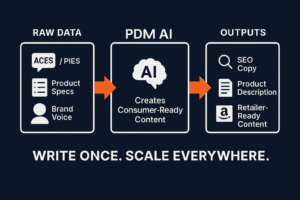The automotive aftermarket is a complex and competitive landscape where collaboration between manufacturers and resellers is essential for success.
To foster successful relationships with retail leaders like Amazon, it is crucial to use standardized product data, specifically ACES (Aftermarket Catalog Exchange Standard) and PIES (Product Information Exchange Standard). These standards ensure that all product information—from detailed specifications to compatibility data—is accurate, comprehensive, and easily exchangeable across different platforms.
Resellers like Amazon and AutoZone rely heavily on precise product data to drive their complex logistics and sales systems. Accurate ACES and PIES data help align product offerings with specific market needs and boost consumer confidence through correct part fitment information, reducing costly returns and increasing customer satisfaction.
Understanding and implementing a solid ACES and PIES strategy is a cornerstone of thriving in the aftermarket sector. Manufacturers can build stronger relationships with resellers by prioritizing these data standards, ensuring both parties can achieve their business goals in a highly competitive market.
Quality product data is the cornerstone of collaboration
The first step in building a long-term relationship with a reseller is preparing your automotive product data for maximum effectiveness.
Aftermarket data accuracy and organization
The importance of having precise and well-organized product information cannot be overstated when it comes to selling automotive parts in the aftermarket.
Resellers require detailed, accurate data to ensure compatibility and to meet customer expectations. Effective organization of product information facilitates quick and accurate retrieval, helping resellers efficiently navigate vast catalogs to find the right parts. Manufacturers must structure their data meticulously, ensuring that all relevant details, such as dimensions, materials, part numbers, and compatibility, are clearly defined and easily accessible. This level of precision supports resellers in providing excellent customer service and reduces the risks associated with returns and customer dissatisfaction due to incorrect parts.
Tools and systems for managing automotive data
Manufacturers can use a product information management system (PIM) to effectively manage and distribute ACES and PIES compliant data.
PIM systems allow manufacturers to centralize all product data, ensuring that all information is consistently updated and accurately maintained across all sales channels. These systems are designed to handle the complexities of automotive data management, including supporting ACES and PIES standards, which are essential for ensuring data is compatible with the systems used by resellers like Amazon and AutoZone. Tools such as data quality management software and integration solutions can help cleanse data, resolve discrepancies, and synchronize information across different platforms, further enhancing the accuracy and utility of the product data.
Regular updates and maintenance
Maintaining the accuracy of product data over time requires regular updates and ongoing maintenance.
The automotive aftermarket is dynamic, with frequent changes in specifications, introductions of new products, and discontinuations of older models. Manufacturers must establish processes to update their product information to reflect these changes promptly. This is crucial for maintaining compliance with ACES and PIES and ensuring that resellers and, ultimately, customers have access to the most current product information. Regular audits of the data, scheduled updates, and the use of automated systems to alert stakeholders of changes are all practices that can help maintain the integrity and relevance of product data over time.
Collaboration beyond product data
There are many other revenue-boosting strategies that go beyond making your ACES and PIES data easily transmissible via an advanced PIM system. While these are not unique to the automotive aftermarket, most of these tips and tricks are especially useful when dealing with aftermarket products due to the unique nature of the aftermarket.
Communication channels
Effective communication channels help in coordinating marketing efforts, managing inventory levels, and addressing customer service issues promptly.
Manufacturers should consider implementing dedicated communication platforms such as CRM systems, regularly scheduled meetings, and direct lines to key personnel to encourage real-time discussions and decision-making. These platforms not only streamline communications but also help in building trust and transparency between the manufacturer and the reseller, which are crucial for a long-term partnership.
Feedback loops
Creating systematic feedback loops is vital for manufacturers to stay responsive to the evolving market.
Feedback regarding product data accuracy, market trends, and consumer demands can greatly influence product development and marketing strategies. Manufacturers should set up structured methods such as surveys, focus groups, and digital feedback tools that allow resellers to provide insights easily.
Additionally, integrating feedback mechanisms into PIM systems can automate the process of collecting and analyzing data from resellers. This data can be invaluable for continuously improving products and services, ensuring that offerings remain competitive.
Training and support
Providing comprehensive training and support to resellers is another critical aspect of a successful partnership.
Regular updates and refresher courses can help maintain high levels of competency among reseller teams. Manufacturers can develop robust support resources, such as online portals with training materials, FAQs, and troubleshooting guides, which resellers can access anytime to resolve issues quickly and efficiently. Such support not only enhances the resellers’ ability to sell more effectively but also increases their ability to provide exceptional service to end customers, reflecting positively on the manufacturer.
Leveraging technology to build value
As an aftermarket business grows, leadership will need to rely on technology that is designed to make collaboration more productive.
Integration of ERP and PIM systems
Integrating Enterprise Resource Planning (ERP) with Product Information Management (PIM) systems streamlines communication between business operations, ensuring consistent and accurate data across inventory and order management. This synchronization reduces errors, saves time, and maintains data consistency, helping resellers rely on accurate product data for better market responsiveness and customer satisfaction.
Sharing aftermarket data analytics with resellers
Data analytics allows manufacturers to gain insights into sales trends, customer preferences, and market dynamics. By sharing these insights with resellers, manufacturers can help them adjust their marketing strategies, optimize inventory, and anticipate consumer demand. Predictive analytics can also forecast future automotive trends, empowering resellers to adjust their strategies for maximum effectiveness proactively.
Cloud-based platforms
Cloud-based platforms facilitate real-time data sharing and collaboration, which is essential in dynamic industries like the automotive aftermarket. These platforms ensure that all stakeholders can access and update data anytime, anywhere, improving project management and reducing time-to-market. Enhanced security measures on cloud platforms also protect sensitive data, ensuring that it remains secure.
Share manufacturer data quickly and accurately with PDM
Partnering with PDM allows aftermarket businesses to harness the power of precise ACES and PIES data. Our advanced Product Information Management (PIM) systems ensure your product data is accurate, perfectly organized, and easily accessible – facilitating better decision-making and improving customer satisfaction at top automotive retailers.
Take the first step towards building stronger relationships with key resellers and seeing your products thrive in competitive markets by contacting PDM Automotive today

More Resources
Elevate Your Brand in the Automotive Aftermarket With These Content Management Strategies



